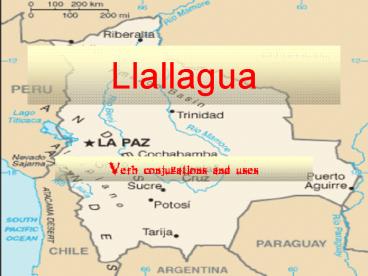Llallagua PowerPoint PPT Presentation
1 / 15
Title: Llallagua
1
Llallagua
- Verb conjugations and uses
2
Tuesday 2 April
- We are going to meet a boy today who will tell us
(in Spanish) about where he comes from. - Our objective
- To learn about a new city
- To learn at least 5 new words
- To notice when we use ser and when estar
- Your challenge
- Try to understand as much of what he says as you
can. - Try to remember as much of what he says as you
can. - Things to look out for
- Verb use (conjugated vs infinitives)
- New vocabulary
- Also see what similarities and differences
- there are between you and him.
3
The Global Dimension
This lesson is also helping you to gain a global
dimension to the things you learn in school.
This is emphasised in the updated curriculum. It
will help you to think about
- Diversity similarities and differences between
life in Llallagua, Peru and the UK. - Values and perceptions the narrator has a
different image of the world and these affect his
values and attitude. - Social justice the difficult lifestyle of the
miners is described.
4
Where is he from? Where is that country? Where is
his city? Whats the climate like? How big is the
population?
De donde es él? Donde está el país? Donde está su
ciudad? Cómo es el tiempo? Cómo grande es la
población ?
5
Hola. Yo soy boliviano. Bolivia es un país en
America del Sur. Mi país está muy lejos de
Inglaterra. Yo vivo en Llallagua.
Mi ciudad está en las montañas. Hace frío casi
cada día. No hay muchas personas en Llallagua,
comparado con el capital.
6
- Where do most people work?
- Is it pleasant work?
- Why do they do it?
- Does he want to work there when he grows up?
7
Mucha gente en Llallagua trabaja en minar. Este
trabajo es muy difícil, sucio y peligroso. Pero
no hay muchas otras opciones. Necesitamos ganar
el dinero para sobrevivir.
Cuando soy adulto, yo no deseo trabajar como
minero. Quiero aprender en la escuela para hacer
algo diferente con mi vida.
8
Who else works, as well as grown-ups? Why do they
work? What jobs do they do?
9
Aquí, los adultos no son los únicos que trabajan.
Muchos, muchos niños trabajan también. Tenemos
que ayudar a nuestras familias. Limpiamos
ventanas, pulimos los zapatos, vendemos cosas en
la calle, hacemos cualquier cosa posible.
10
- What do people buy at the market?
- Why dont they shop at supermarkets?
- What is good about working at a market?
- What isnt so good?
11
En Llallagua vamos al mercado a comprar nuestro
alimento, nuestra ropa, todo! No tenemos
supermercados como en Inglaterra. Hay muchos
niños que trabajan en el mercado. Es agradable
hablar con la gente, pero duelen las manos.
12
- What do people use to cook with?
- What do people eat most of the time?
- How often do they eat chicken, beef or lamb?
- When do they eat guinea pig?!
13
Utilizamos los ingredientes frescos. Comemos las
patatas y el arroz para la mayoría de las comidas.
- Tenemos a veces el pollo, la carne de vaca o el
cordero. Si es una ocasión especial comemos el
cuy.
14
Do they have many toys? Do they have many
friends? How do they get around their lack of
things?
15
No trabajamos siempre, jugamos a veces también.
No tenemos muchas juguetes, pero tenemos muchos
amigos y compartimos siempre nuestras cosas. Es
bueno compartir cosas con amigos.
16
So what do you remember?In Spanish if you can.
- Where is he from?
- Where is his country?
- Where is his city?
- Whats the climate like there?
- How big is the population?
- Where do most people work?
- Is it pleasant work?
- Why do they have do it?
- Does he want to do the same when he grows up?
- Who else works, as well as grown-ups?
- Why do people work? What jobs do they do?
- What do people buy at the market?
- Why dont they shop at supermarkets?
- What is good about working at a market?
- What isnt so good?
- What do people use to cook with?
- What do people eat most of the time?
- How often do they eat chicken, beef or lamb?
- When do they eat guinea pig?!
Anything else?

